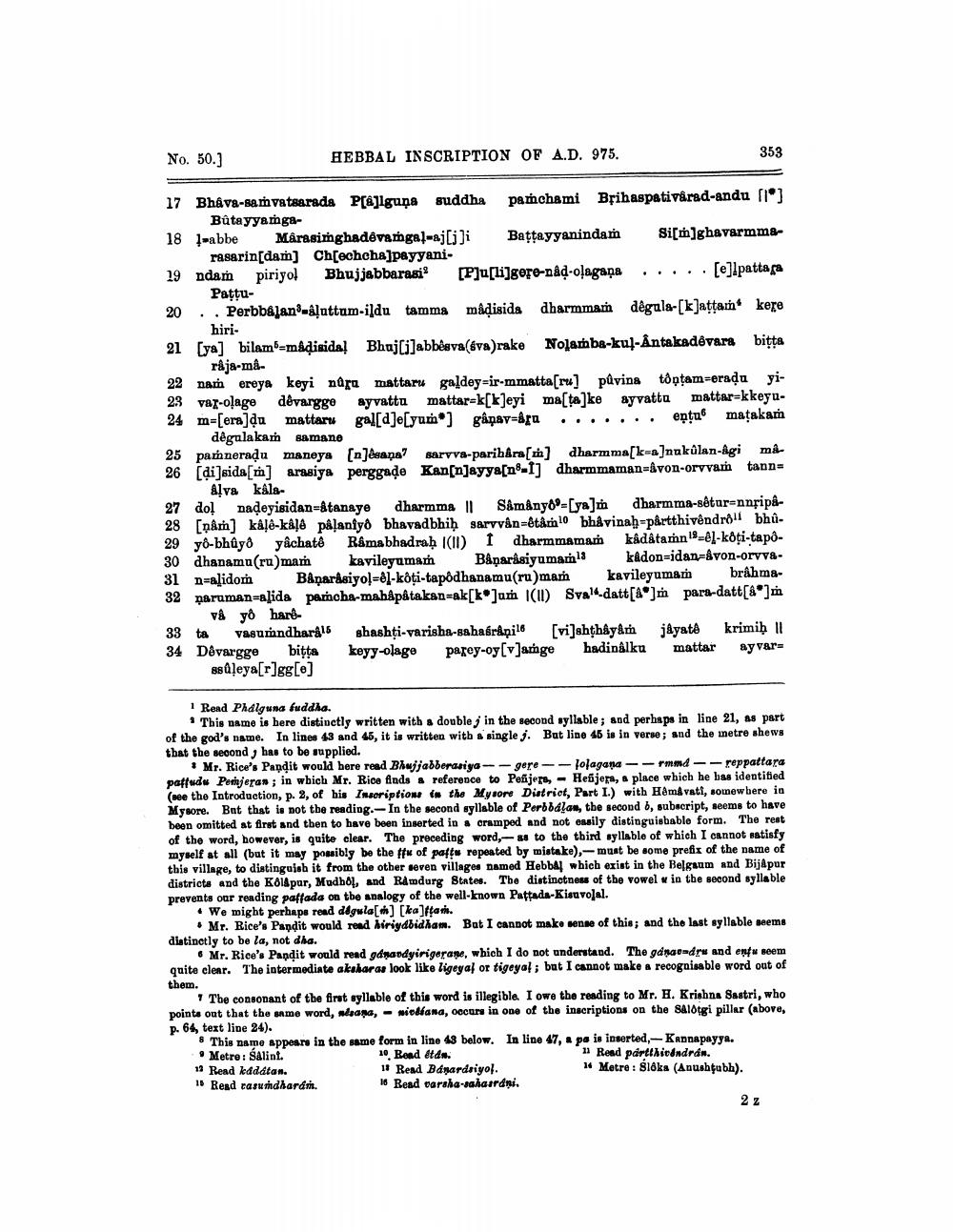________________
No. 50.1
HEBBAL INSCRIPTION OF A.D. 975.
353
17 Bhava-saṁvatsarada P[@]lguna suddha pamchami Brihaspativarad-andu ll"]
Bûtayyamga18 ]-abbe Mârasimghadêvamgal-aj[j]i Baţtayyanindam Si[m]ghavarmma
rasarin[dam] Ch[echcha]payyani19 ndaṁ piriyo! Bhujjabbarasi [P]u[li]gore-nad-o!agana . . . . . [e]lpattaya
Pattu20 .. Perbb&lan-&?attam-ildu tamma mâdisida dharmma dêgula-[k]attam kere
hiri21 [ya] bilamb=madinida! Bhaji]abbêsva(bva)rake Nolamba-kul-Åntakaddvara bitta
rája-má. 22 nam ereya keyi nura mattaru galdey=ir-mmatta[ru] půvina tôộtam-eradu yi23 vax-olage dêvargge syvattu mattaræk[kleyi ma[ta]ke syvatta mattar=kkeyu24 m-[era]du mattaru gal[d]e[yum®] gânav=&ra ....... enta matakam
dégulakan samano 25 paṁneradu maneya [n]esapa? sarvvs-parihåra[m] dharmma[k-a]nakûlan-agi ma26 [di]sida[m] arasiya perggade Kan[n]ayya[no-1] dharmmaman=&von-orvvar tann
Alva kals27 do! Dadeyisidan=tanayedharmma 11 Sâmányd®-[ya] dharmma-sêtur=nnţipâ28 [ņåm] kaļ8-kaļg pålaniyo bhavadbhiḥ sarvvån=t&m 10 bhAvinah-partthivêndrði bhû29 78-bhûyê yâchat& Ramabhadrah (II) I dharmmamam kadátamno=@l-koti-tap30 dhanamu(ru)mam kavileyuma Båparasiyuman kadon=idan-avon-orvv&31 n=alidom Banarasiyol=el-kôţi-tapôdhanamu(ru)mam kavileyumam brâhma32 naruman=alida parcha-mahåpåtakan-ak[k]um (1) Sval-datt[@]m para-datt[&*] min
vå yo haré 33 ta vasunndhara's shashti-varisha-sahabránil6 [vi]shthay&m jáyath krimiḥ Il 34 Dêvargge bitta keyy-olage parey-oy[v]ange hadinâlku mattar ayvar
ssüleya[r]gg[e]
Read Phalguna fuddha.
* This same in bere distinctly written with a double j in the second syllable; and perhaps in line 21, as part of the god's name. In line 43 and 45, it is written with a single j. But line 46 is in verse; and the inetre shews that the second has to be supplied.
* Mr. Rice's Pandit would bere read Bhujjabberasiya--gore-- Polagana -- mid--reppattara pattudu Perjeran; in which Mr. Rice finds a reference to Peñijeri, - Heijer, place which he has identified (see the Introduction, p. 2, of his Insoriptions to the Mysore District, Part I.) with Hemavati, somewhere in Mysore. But that is not the reading. In the second syllable of Perbbalan, the second b, subscript, seems to have been omitted at first and then to have been inserted in & cramped and not easily distinguishable form. The rest of the word, however, is quite clear. The preceding words to the third syllable of which I cannot satisfy myself at all (but it may possibly be the ff of pafts repeated by mistake),- must be some prefix of the name of this village, to distinguish it from the other seven villages named Hebbal which exist in the Belgaum and Bijapur districts and the Kolapar, Mudhol, and Ramdurg States. The distinctness of the vowel in the second syllable prevents our reading paffada on the analogy of the well-known Pattada-Kisuvolal.
• We might perhaps read digwla[] [ka]ttan.
Mr. Rice's Paņdit would read hiriydbidham. Bat I cannot make sense of this; and the last syllable seems distinctly to be la, not dba.
6 Mr. Rice'. Pandit would read gdnandyirigerane, which I do not understand. The gaineradre and ent seem quite clear. The intermediate akshar as look like ligey al or tigeyal; but I cannot make a recognisable word out of them.
"The consonant of the first syllable of this word is illegible. I owe the reading to Mr. H. Krishna Sastri, who points out that the same word, ndoana, - wiodiana, occurs in one of the inscriptions on the salotgi pillar (above, p. 64, text line 24).
* This name appear in the same form in line 43 below. In line 47, - pa is inserted,-KAnnapayya. • Metro: Salint. 10. Read etds.
11 Read partiendran. 11 Read kdddtan. 11 Read Bánardriyol.
1 Metre : sloka (Anushtabh). 15 Read earundhardin.
16 Read varsha-sahasrdni.




